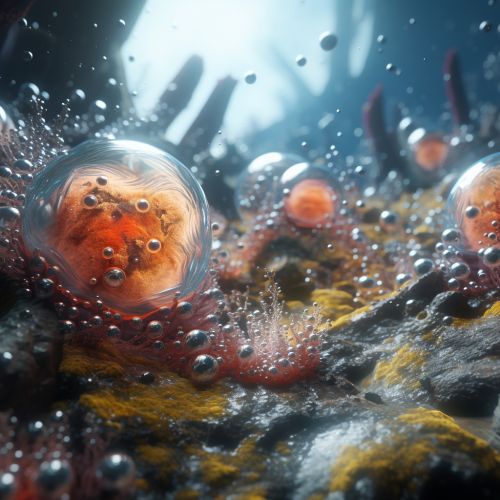Thermodynamics of Enzyme Reactions in Extreme Environments
Introduction
Thermodynamics is a branch of physics that deals with heat and temperature, and their relation to energy, work, radiation, and properties of matter. The behavior of these quantities is governed by the four laws of thermodynamics which convey a quantitative description using measurable macroscopic physical quantities. In the context of biochemistry, thermodynamics is applied to understand the energy changes that occur during enzyme reactions, particularly in extreme environments.


Enzymes and Their Function
Enzymes are biological catalysts that speed up chemical reactions in living organisms. They achieve this by lowering the activation energy required for the reaction to proceed. Enzymes are proteins, and like all proteins, they have a specific three-dimensional structure that is essential for their function. This structure is determined by the sequence of amino acids that make up the enzyme. The part of the enzyme where the reaction takes place is called the active site.
Thermodynamics of Enzyme Reactions
The thermodynamics of enzyme reactions is a complex field that involves the study of energy changes during enzyme-catalyzed reactions. The energy change in a reaction is represented by the change in Gibbs free energy (ΔG). The ΔG of a reaction provides information about the spontaneity of the reaction. If ΔG is negative, the reaction is spontaneous; if it is positive, the reaction is non-spontaneous.
Enzymes in Extreme Environments
Some organisms, known as extremophiles, thrive in extreme environments such as high temperature, high pressure, high salinity, or extreme pH. These organisms have enzymes that are adapted to function optimally under these extreme conditions. These enzymes, known as extremozymes, have unique structural features that allow them to maintain their function under extreme conditions.
Thermodynamics of Enzyme Reactions in Extreme Environments
The thermodynamics of enzyme reactions in extreme environments is a specialized field of study within biochemistry. It involves the study of how extremozymes function under extreme conditions, and how these conditions affect the energy changes during enzyme-catalyzed reactions. The study of extremozymes not only provides insights into the fundamental principles of biochemistry and thermodynamics, but also has potential applications in biotechnology and industrial processes.
Conclusion
The study of the thermodynamics of enzyme reactions in extreme environments is a fascinating field that combines principles of physics, chemistry, and biology. It provides insights into the fundamental principles of life and has potential applications in various fields. Despite the challenges posed by extreme environments, life has found a way to adapt and thrive, and enzymes play a crucial role in this adaptation.
